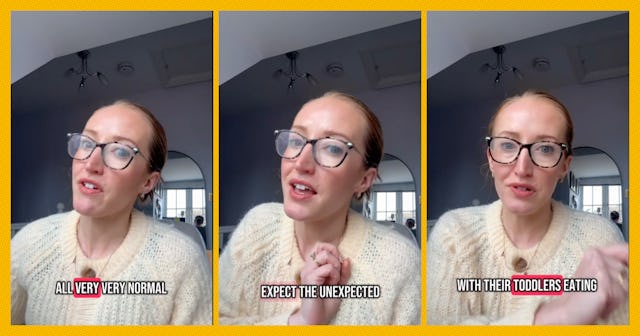A Children’s Nutritionist Shares Her 4 Truths About Toddler Eating
It’s not personal: it’s just the age...

My youngest child’s six month “birthday” came at the end of November, and so I had the absolute joy of being able to give them their first “real” food —a sweet potato purée — at Thanksgiving dinner. The whole family gathered as the spoon went to their lips and we laughed in glee as the little one grabbed the spoon for more. “They’re going to be a foodie, I can tell!” my mom declared, and for the next 18 months she was right. This kiddo ate everything. Sushi. Broccoli. Tofu. Their favorite dinner was a spicy jerk chicken stew. I was so proud — no, smug. Who were all these kids who only ate nuggets? Simply give your child a platter of cruciferous vegetables! Then my child turned 2, and for the past 10 years, have lived on goldfish and girl dinners.
Apparently, says Lucy Upton, a nutritionist specializing in children’s nutrition, this is kind of par for the course...
“Why are more parents not told or prepared for what’s going to happen with their toddler’s eating?” she begins in a recent TikTok. “I want to give you a big hug, and a punch, about what is going to happen during the toddler years ... mainly so that you don’t go looking to blame yourself or something else going on when, actually, lots of the things we see are very, very typical.”
Here are some things Upton wants folks to know...
Expect the unexpected
Honestly, it stands to reason: they’re unpredictable in everything else so, really, why should this be any different?
“There is some stuff going on for your toddler,” she explains. “One, their growth is going to start slowing down. They do not need as many calories per kilogram of their body weight to grow, which means they may not eat as much, they may sometimes refuse meals or snacks all together. Some weeks you’ll be thinking they live on photosynthesis. And that is all very, very normal.”
Their development is going to be changing their interactions with food all together.
“Your baby, who was primed to learn to eat, learn to accept different tastes and textures and thought ‘Oh yes, a lemon! Oh yes, give me that asparagus!’ is now going to be looking at food like it landed from Mars.”
This, too, is normal. And, like toddlers themselves, it is immune to your “logic” and “facts.”
“Please don’t try saying to them ‘But you used to eat it; you used to love it,’” she advises. “Because they don’t care and they also don’t remember.”
They’re not interested in leisurely dinners
“They might only last two to five minutes at meal time,” she says. Definitely not the relaxed meals you and your partner might have grown accustomed to in life pre-kids. This comes down to their seeing eating as much more functional than you probably do and, come on: just think about their teeny tiny attention spans!
It might worry some parents to see such a quick turn around from eating to play. But Upton says it’s fine. “As long as you’ve given them an opportunity to eat, ideally if you’re sitting with them or at least providing some connection — another reason for them to be at the table — they will eat to their appetite.”
Speaking of which...
Trust that they will eat... eventually
“They have an internal mechanism to recognize when they are hungry and when they are full,” Upton reassures us. “That is not going to be driven by your expectations, your demands, or the clock. They are going to be listening to their body. That means some days they’re going to eat you out of house and home and other days they’re surviving on photosynthesis.”
The tl;dr of it all: it’s not your cooking, and your child isn’t broken. They’re just a toddler. Present them with nutritious foods and, at the end of the day: they’re not going to starve.